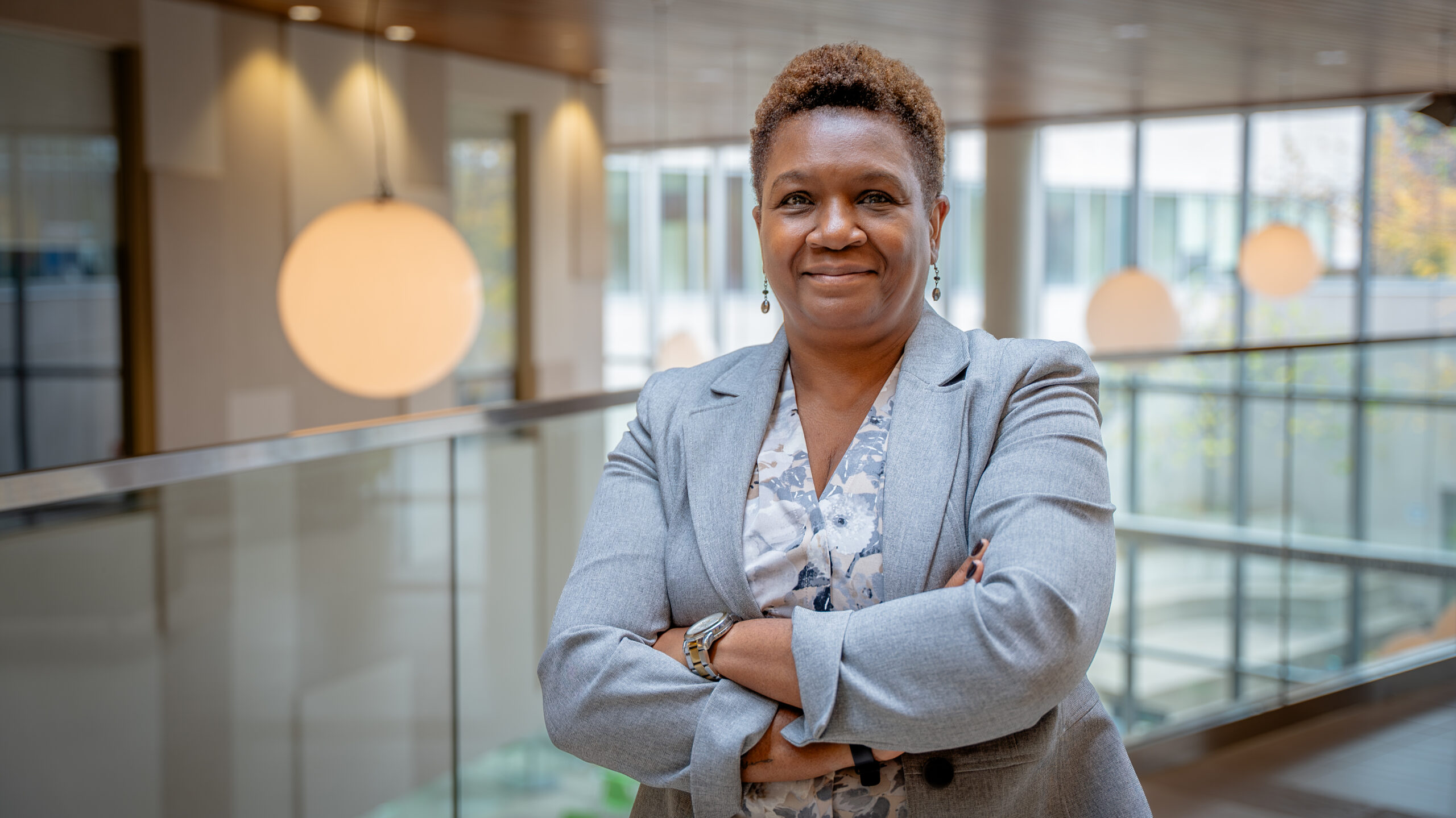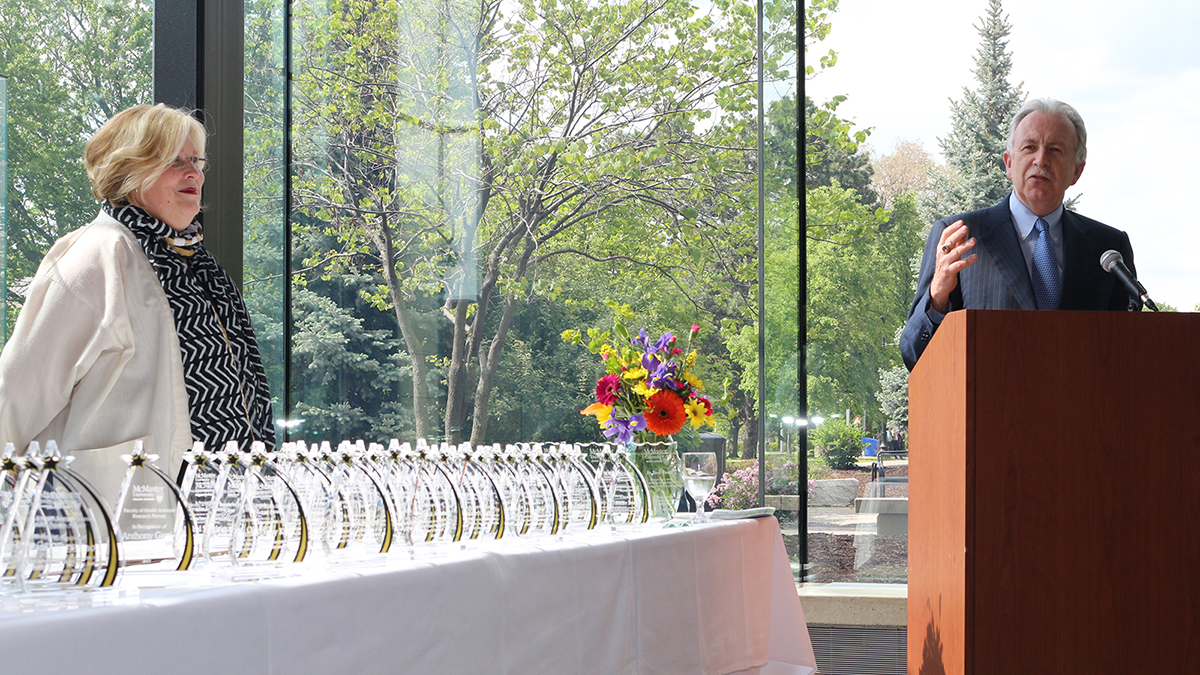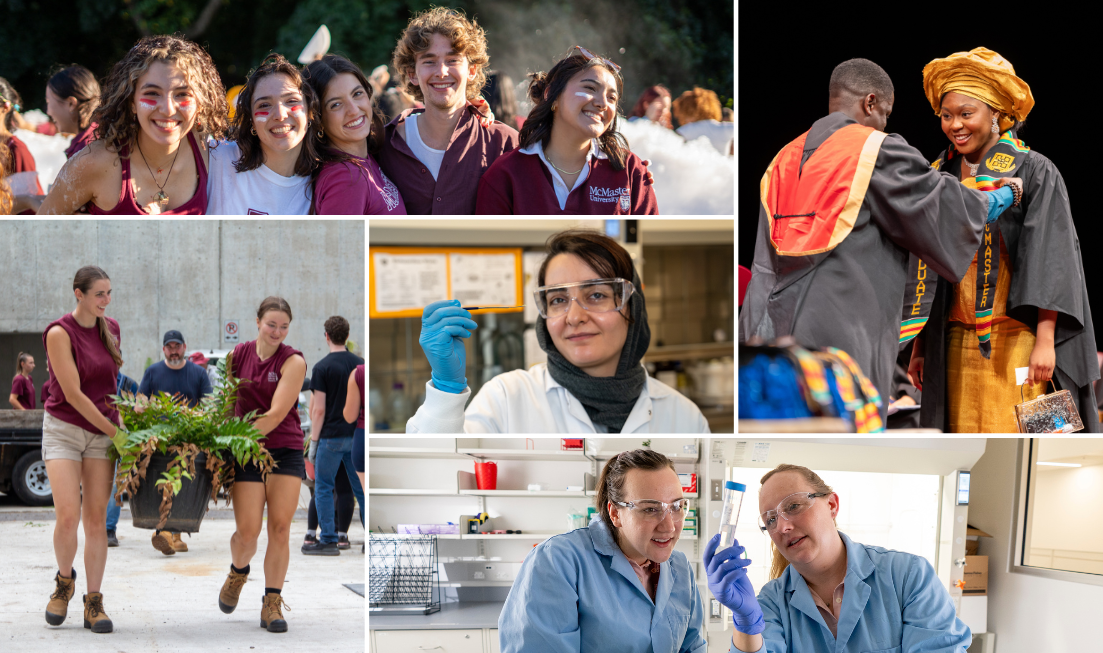Come to work with a director of administration

McMaster University’s Faculty of Health Sciences is powered by nearly 1,500 staff members. In the series “Come to work with,” we’re profiling staff across the Faculty and the critical work they do.
Beverley Pindar-Donick is the director of administration for the Department of Psychiatry and Behavioral Neurosciences. We spoke with Pindar-Donick about her 35+ years with the university, the lessons she’s learned along the way, and the important work she’s doing to drive forward anti-Black racism education.
Who are you and what is your role with McMaster’s Faculty of Health Sciences?
I’ve been with McMaster since 1985, and I am currently the director of administration for the Department of Psychiatry and Behavioral Neurosciences. I’ve been in this position since 2018 and prior to this I was in the same position with the Department of Obstetrics and Gynecology. The positions are similar in that we are the senior administrator in the department reporting directly to the chair.
As the director of administration, I’m responsible for the overall operational management of the department – that’s dealing with all resources from finances to people, recruitment of staff and faculty, to space and managing inter-institutional relationships. With the clinical departments, there’s a large range of things that we do in terms of supporting the mandate of education, research and clinical services within the hospital setting. Every day is different, which really is what keeps it interesting. I always have a to-do list, attend a lot of meetings, and each meeting usually means adding about 10 more things to the list!
You’ve been with McMaster for 35+ years! What keeps you interested?
There have been a lot of opportunities at the university. Over the years, I completed my honours and masters degrees, and I’ve also attended a lot of courses and one-day workshops. I’ve always taken advantage of being able to do those things, and so it’s the opportunities at the university that allow you to be able to pursue education or to advance in your career if that’s what you want to do. I have a very strong work ethic and it is important for me to be interested and engaged in the work that I am doing.
The university has been a really great employer – we have a lot of benefits. Some of them as I mentioned are educational, but there are a lot of other benefits. I’d also say the people keep me interested. I’ve met some of my best friends at McMaster and we continue to be friends even though they are no longer with the institution. Like everyone, there are some days you don’t like everything about your job or you have frustrating things to deal with, and challenges to face that are sometimes out of your control. For the most part it’s the people and the opportunities to improve systems and processes that keep me interested.
What advice would you give to someone just starting their career at McMaster?
Relationships are so important. It’s the relationships that you form that sometimes help you to get certain things done. When you know different people in various areas who can help you or who you can consult with, it’s very helpful. I would say that that’s probably one of the number one things, even in life – the ability to form good relationships with people and network.
What’s the biggest lesson you’ve learned in your career?
I would say as a Black woman in the university setting, a lesson for me has been to continually look for opportunities to educate myself or for career growth. I often had to look for career opportunities myself – as I was not somebody people naturally thought of or approached. Also, another lesson and/or reality for me has been how to manage being the only racialized person in the room and not always assuming that I will be accepted.
Having a career and working hard is important, but it’s not as important as personal family time and taking care of yourself. There were times that I was so caught up and focused a lot of my energy on work challenges, but looking back I wish that I had focused more on my own mental health and the needs of my family.
You helped establish and are the project manager of the Anti-Black Racism & Critical Race Education course. Can you please tell us about this important course and how it came to be?
You’ll recall in 2020 George Floyd was murdered in the U.S., and that ignited a lot of discussions, not only in our department but around the world. People were asking for educational opportunities about anti-Black racism and so I put together a resource list with books, articles, podcasts and movies for department members to learn. Our chair at the time had previously supported a number of faculty, staff leaders and residents to do the San’yas Indigenous Cultural Safety training, which was extremely helpful. There was interest in learning and doing more and so when the question was asked about learning opportunities, we searched but could not find any anti-Black racism online courses similar to the San’yas training.
Around that time, I was introduced to a professor at Memorial University, Paul Banahene Adjei, who offered and taught federal and provincial government employees on issues around equity, diversity and anti-racism. He runs a series of sessions about anti-Black racism and critical race theory. We knew it would be difficult to get all our faculty and staff together for those sessions. So I continued to have discussions with Paul to see if he would be interested in creating online modules from his many years of work and research.
It took us a couple of years, but we put together an online course that people could do on their own time as opposed to trying to bring everybody together at one point. Last summer, we hired some students to help organize the content and multi-media, and working with an instructional designer, we were able to complete the project. The course is nine modules over a 10-week period, with three virtual tutorials with Dr. Adjei. It’s available to anyone through McMaster’s Continuing Education, and our first offering was in May of this year. It was a lot of extra work to put this together, kind of “off the side of my desk,” but it feels good that we were able to accomplish what we set out to do.
It’s really interesting and important because people aren’t taught any of this content through the school system. Module three, for example, is about the history of Black Canadians – it dispels some myths, like Canada didn’t practice slavery or that Canada was a safe-haven to Black people trying to escape the U.S. – neither of those things are true.
It is important for everyone of every race to learn about anti-racism. The hope is that with education we can begin to recognize the ways that white supremacy and implicit biases have shaped social behaviours, society and our institutions. The overall goal is that it helps to empower leaders and those in positions of power to use their influence to educate others and make the much-needed changes to systemic barriers.
Come to work with, Faculty & StaffRelated News
News Listing

Faculty of Health Sciences 2024: The year in awards
#Shorts, Faculty & Staff, Feature
December 10, 2024

McMaster professor emeritus named recipient of Canadian Blood Services Lifetime Achievement Award
Faculty & Staff, Leadership
December 5, 2024

